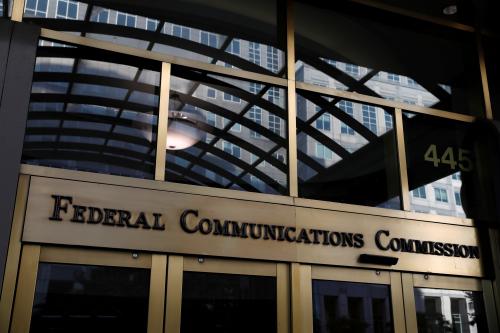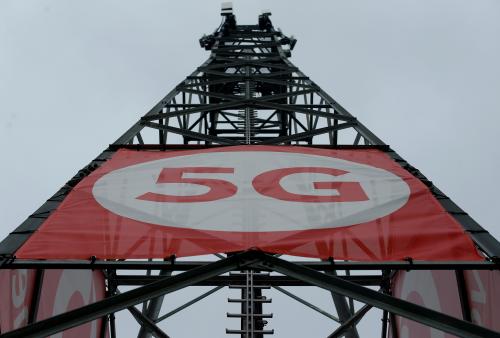Tom Wheeler served as the 31st Chairman of the Federal Communications Commission from 2013-2017.
“Trump team mulls federal takeover of 5G,” Axios Sneak Peak headlined January 28. Included in the excellent reporting and analysis was a 30-page PowerPoint presentation developed by the National Security Council (NSC) staff proposing a government-owned, fifth-generation (5G) wireless network as a solution to the cybersecurity challenges presented by the new technology.
It is a breath-taking proposal from the King of the Deal’s White House! Even European governments that formerly owned their telecommunications networks have recognized that state ownership is a disincentive to efficiency and technological progress. The Australian government tried—and failed—to build a government-owned wholesale fiber network.
The immediate effect of this proposal, no doubt, will be to raise uncertainty in the ongoing investments to build a 5G infrastructure. It is an amazing outcome, considering how the Trump FCC railed about how the Open Internet rules had chilled network investment. Those claims were non-factual lobbying arguments of the major carriers. Now the Trump administration has forced every wireless carrier to hold off on their 5G investment.
They were warned
For this administration, it appears cybersecurity worries trumps all. But they can’t say they weren’t warned.
When the outgoing Federal Communications Commission (FCC) cyber experts met with the Trump FCC and NSC transition teams, they expressly informed them that a FCC retreat from ongoing cybersecurity activities would have dire consequences for 5G and the future of the nation’s critical communications infrastructure.
Nevertheless, the Trump administration ignored cyber concerns in the selection of the new chairman. Immediately upon taking office, the chairman rescinded the Obama FCC’s requirement that any new 5G technology must have built-in cybersecurity standards in order to operate in the United States. It was a little noticed and highly significant repeal of a historic FCC action: the Obama FCC had for the first time in history required that cybersecurity be a priority rather than an afterthought in planning for a new network. The industry opposed the idea, and the Trump FCC bowed to their wishes, cancelling an ongoing proceeding on the topic.
Even before this, the Trump FCC had pulled from public view a study by FCC economists that reported on the growing gap between cybersecurity investment in the communications sector and what was needed to protect the nation. The new chairman also pulled cybersecurity considerations out of the new internet protocol-based television broadcast standard (a backdoor to home routers and thus into all broadband-connected devices). One Republican commissioner told a Senate hearing that the agency’s cybersecurity responsibility was “extremely limited.”
So, now the White House awakens to the consequences of the FCC’s actions: worsening vulnerabilities to cyber threats in the next-generation wireless network.
Smarter than the market?
That the Trump administration national security staff is considering government ownership of the means of production and the essential network for the 21st century is mind-boggling. Apparently, just waking up to what they were told during the transition, but was ignored by the Trump FCC, their response is to attack the competitive market and suggest government can do it better.
Thanks to the efforts of the Obama administration’s FCC and Department of Justice, the American market still benefits from the existence of four national wireless carriers. The United States was the first nation in the world to set aside spectrum for 5G networks, and to allow those networks to be built in any frequency range, including the mid-band suggested by the NSC report. Together, those forces have propelled American wireless carriers to spend billions of dollars in 5G research, testing, and deployment.
Throughout the discussion of next generation networks during the Obama administration, the constant refrain was “government isn’t as smart as the markets to decide which spectrum and which technology to use.” Flexibility and competition were the policy watchwords.
Now, the Trump administration has decided that they are indeed smarter than the competitive market. At a time when the Trump FCC has granted the companies they are supposed to regulate their every deregulatory wish, the chickens have come home to roost. It is hard to believe in an era of $24 million Air Force One refrigerators that government procurement is the best way to build the next generation network. But the NSC staff have concluded that the cyber risk—exacerbated by the FCC’s cyber failures—makes this essential.
Of rich irony is the report’s focus on fiber backhaul as the key to a 5G rollout. It is correct, 5G’s smaller cell size increases the need for deeper fiber penetration. Rather than spending an estimated $200 billion to nationalize that capacity, however, the Trump FCC can embrace the Business Data Services proposal of the Obama FCC (that was opposed by the Republicans): that the existing fiber backbone should be made available at truly just and reasonable prices to all.
The 5G future is a huge challenge, and the role of government in assisting its speedy rollout is critical. The concept of a carrier-owned shared network worked in the early rollout of wireless. The responsibility for the cybersecurity of the network must be a priority, rather than an afterthought. When the Obama FCC left office, the United States led the world in 5G. Whether a nationalized network would allow the U.S. to recover its leadership is doubtful.
The Brookings Institution is committed to quality, independence, and impact.
We are supported by a diverse array of funders. In line with our values and policies, each Brookings publication represents the sole views of its author(s).







Commentary
Building a secure 5G network without nationalization
January 29, 2018